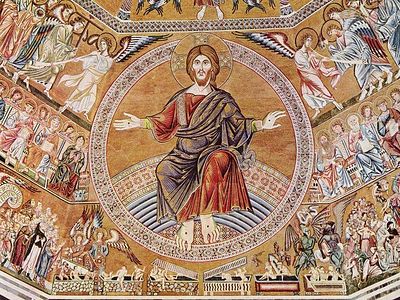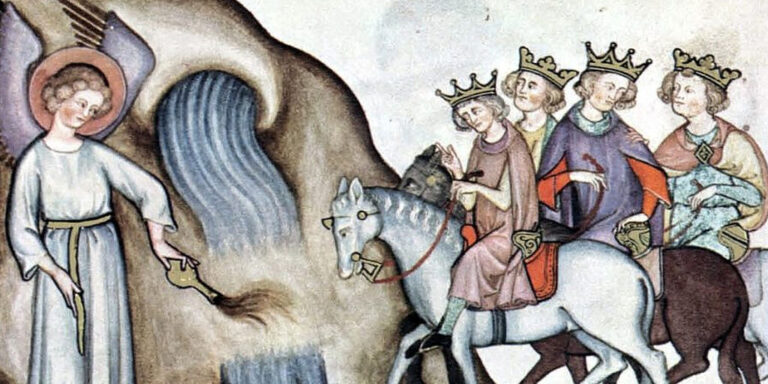Our Passions are IdolsWhom does the Lord receive? The Gospel answers this for us: the publican.
War Against the Church
We continue our interpretation of the Revelation of the Apostle and Evangelist John the Theologian. Let’s recall our previous talk. We spoke about seven seals that were removed, and seven angels who blew their trumpets. The first angel sounded his trumpet and hail, fire, and blood fell upon the earth. The second angel sounded his trumpet, and one third of the creatures in the sea perished. The third angel sounded his trumpet, and a third of the springs and rivers became bitter. The fourth angel sounded his trumpet, and a third of the sun, the moon, and the stars were hidden; day and night were deprived of a third of their light. Then there appeared a soaring angel who spoke of the grief that came to those living on earth from the voice of the other three trumpets. The fifth angel sounded his trumpet and a star fell from the sky, and a well opened, from which came terrible locusts that began to do harm on the earth. The sixth angel sounded his trumpet and freed the four angels at the Euphrates River.
Now we continue; let’s read the tenth chapter. And I saw another mighty angel come down from Heaven, clothed with a cloud: and a rainbow was upon his head, and his face was as it were the sun, and his feet as pillars of fire (10:1). The Apostle John continues to see these images by the grace of the Holy Spirit. Another angel appears, surrounded by a cloud, descending from Heaven. Above his head is a rainbow, and his feet are like pillars of fire.
And he had in his hand a little book open: and he set his right foot upon the sea, and his left foot on the earth (10:2). This angel, who appeared in such amazing and magnificent glory, was holding an open book in his hands. He put his right foot in the sea, and his left on earth.
Then he continues to describe the angel: And cried with a loud voice, as when a lion roareth: and when he had cried, seven thunders uttered their voices (10:3). We’ve talked about how we can express all this in our everyday language, but we can’t explain it. It’s dangerous for us to start talking confidently about the meaning of images, naming times and circumstances. Nevertheless, we can make some definite conclusions from these texts.
And when the seven thunders had uttered their voices, I was about to write: and I heard a voice from Heaven saying unto me, Seal up those things which the seven thunders uttered, and write them not (10:4). Do you understand that these weren’t ordinary, natural thunderings, but voices uttering words—very loud and powerful words—similar to thunderclaps? When the Apostle heard them, he went to write it down. But what happened? He was told to conceal them, to keep these words secret, not to record them. God didn’t allow him to record these words. We don’t know why. Despite the fact that the Apostle and Evangelist John heard these words, God didn’t allow him to preserve them.
And the angel which I saw stand upon the sea and upon the earth lifted up his hand to Heaven (10:5). A majestic vision: a huge angel, a giant, something supernatural, an angel of God, with one foot standing in Heaven and the other on earth. He lifted his hand to Heaven. What did he do?
And sware by Him That liveth for ever and ever, Who created Heaven, and the things that therein are, and the earth, and the things that therein are, and the sea, and the things which are therein, that there should be time no longer (10:6). This angel raised his hand to Heaven and began to swear by the eternal, immortal God, Who created Heaven, the earth, the sea, and all that is in them, swearing that that there would be no more time. There is no time left to wait; there will be no delay. And there’s another interpretation: Time no longer exists; we now live outside of time; we’ve gone beyond the boundaries of time. The usual interpretation is that there’s no time left—what’s going to happen will happen soon. He swore by Him Who lives eternally and created everything. He swore by Christ, the Creator of everything.
Christ will emerge victorious in the end
But when the seventh angel begins to sound, the mystery of God will be fulfilled as declared to His prophets (Rev. 10:7). This could be related to the Nativity of Christ. It may also refer to the  Second Coming of Christ. Those who have shown mercy to themselves through repentance will also be presented to Christ by Mercy. Repentance is only possible when the heart is softened and filled with compassion and mercy towards its sinful state. Regardless, Christ’s words will come to pass with utmost accuracy. Heaven and earth may pass away, but My words will never pass away (Mt. 24:35). Every detail will be fulfilled precisely.
Second Coming of Christ. Those who have shown mercy to themselves through repentance will also be presented to Christ by Mercy. Repentance is only possible when the heart is softened and filled with compassion and mercy towards its sinful state. Regardless, Christ’s words will come to pass with utmost accuracy. Heaven and earth may pass away, but My words will never pass away (Mt. 24:35). Every detail will be fulfilled precisely.
Reading Revelation, we may find the events terrifying and dreadful, but there is always hope in the good news of Christ’s Coming and His eternal Kingdom. In the end, Christ will triumph. Evil, the devil, unrighteousness, and sin will not prevail over God. God is omnipotent and eternal, the Creator of Heaven, earth, and everything therein (Rev. 10:6).
This belief forms the foundation of our faith, patience, and life, especially in times of trouble and hardship. It leads us to seek the Living God, who is never in a difficult position. For God, nothing is impossible or insurmountable. While we may face hopelessness, God is our salvation. We must learn to entrust all our difficulties, trials, and sorrows to Him. In times of despair, prayer can bring about miraculous solutions.
Each of us has likely experienced moments when we turned to God in prayer during life’s challenges, only for Him to provide a way out when all seemed lost. Our problem arises when we rely on our own strength and wisdom to solve our issues, rather than trusting in God’s divine intervention.
Instead of trying to fix everything ourselves, we should learn to fervently pray and fully trust in God’s guidance. By committing ourselves and our struggles to Him, we allow God to work wonders beyond our comprehension.
Let us give God the space to work where our efforts fall short, trusting in His divine control over nature and His boundless love for all humanity.
And the voice from Heaven spoke to me again, instructing me to take the open book from the angel standing upon the sea and the earth. I took the book and ate it, finding it bitter in my belly but sweet as honey in my mouth (Rev. 10:8-9).
The taste in his mouth will be sweeter than honey, while the book will taste bitter in his belly. The reasons behind this paradox remain a mystery. Perhaps it is not about literal consumption of a book, but rather the reception of a message or gift from God. The sweetness symbolizes the joy and blessings of God, while the bitterness represents the pain and hardships that often accompany divine gifts.
Consider the prophets, who suffered greatly due to their gift of prophecy. They witnessed the sins and mistakes of the people, yet their warnings often went unheeded. Their gift was sweet because it came from God, but bitter because it brought them pain and suffering as they tried to guide and protect others.
Similarly, those with the gift of seeing into human hearts and thoughts may experience intense emotional pain. Elder Paisios, for example, felt great love for the world but also deep anguish at the sight of sin and spiritual decay. His gift of insight brought him both joy and sorrow, leading to fervent prayers for the world.
In the end, everything is under God’s watchful eye. Just as the Apostle was called to prophesy to all peoples, we too may be tasked with confronting and measuring the spiritual state of the world, even if it means facing bitter truths and enduring hardships. In this text, we come across a prophecy concerning Jerusalem, stating that it will be given to the Gentiles and trampled upon for a specific period of time. It is suggested that this may refer to the time when the Jews reclaimed Jerusalem, but this is uncertain. The message conveyed is that everything is under God’s control, with no detail escaping His watchful eye. The text goes on to discuss two witnesses who will prophesy for a set period while the Holy City is being trampled by pagans. These witnesses, believed to be the Prophets Enoch and Elijah, will call for repentance. They are described as olive trees and candlesticks before God, with the power to defend themselves against harm. The content also explores the ability of these prophets to perform miracles by God’s authority. The text concludes with a reference to a beast that will emerge to wage war against the witnesses, ultimately leading to their defeat. Their bodies will lay in the streets of Jerusalem, symbolically referred to as Sodom and Egypt. The narrative leaves off with a promise of continuation.
Source link



